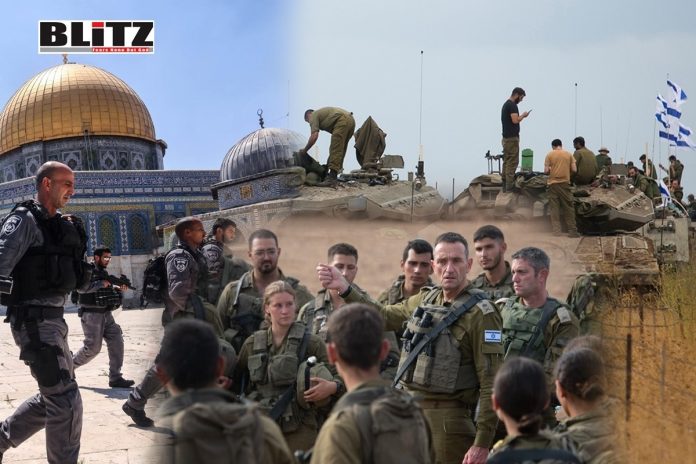Amidst entrenched conflicts and enduring divisions, the choice of Israeli Arabs to join the Israel Defense Forces (IDF) reflects a transformative shift in dynamics and identity. Against the escalating violence in Gaza and the mounting international spotlight, the growing enlistment of Israeli Arabs in the military highlights a nuanced intersection of allegiance, unity, and the pursuit of peace. This evolving trend underscores a profound reevaluation of traditional norms and aspirations within Israel’s Arab community, signaling a departure from conventional expectations.
While historically exempt from mandatory military conscription, Israeli Arabs represent a substantial segment of Israel’s demographic landscape, constituting roughly 20% of the population. Nonetheless, there has been a discernible departure from this longstanding tradition in recent years, as an increasing number of Israeli Arabs are choosing to enlist in the IDF. This departure from the norm, once deemed atypical, has garnered momentum, especially amidst ongoing conflicts and evolving societal perspectives. This trend signifies a significant reevaluation of traditional roles and expectations within Israel’s Arab community, reflecting a broader shift in societal dynamics.
The upsurge in enlistment figures aligns with a phase of heightened tensions, propelled by Israel’s prolonged campaign in Gaza. Concurrently, demands for cessation of hostilities echo throughout the international arena, with protests against the conflict becoming increasingly ubiquitous. These demonstrations underscore a significant global reevaluation of Israel’s image, exemplified by the erosion of formerly favorable perceptions, notably in critical allies like the United States. This shift reflects a mounting disillusionment with Israeli policies and actions, resonating with a broader trend of skepticism towards the nation’s strategies and conduct amidst ongoing conflicts.
Yet, amidst the external scrutiny and condemnation, a counter narrative emerges within Israel’s Arab community. Surveys conducted in November 2023 unveiled a significant shift in sentiment, as 70% of Israeli Arabs articulated a newfound connection to the state and a vested interest in its prosperity. This burgeoning sense of solidarity has manifested in a tangible eagerness among Israeli Arabs to actively participate in the nation’s defense, defying conventional norms and confronting prevailing stereotypes head-on.
One such individual emblematic of this trend is Yusef Hadad, hailing from the city of Nazareth in northern Israel. At the age of 18, Hadad made the decision to enlist in the IDF, joining an elite combat unit known as Golani. Motivated by a belief in the inclusive nature of Israel’s defense forces, Hadad’s journey was not without its challenges. Despite facing adversity and physical injury during combat, he remained steadfast in his commitment to serving the state of Israel.
The dynamic evolution of Israeli Arab involvement in the IDF mirrors a larger narrative of reconciling identities and transforming society. Negotiating the intricacies of dual identities and competing loyalties, Israeli Arabs’ choice to enlist in the IDF signifies a deep-seated transformation in their outlooks and aspirations. Liberated from conventional limitations and ideological divides, these individuals exemplify resilience and inclusivity, transcending obstacles and pioneering fresh avenues towards unity and mutual comprehension.
However, the journey towards reconciliation encounters significant hurdles. The relentless conflict in Gaza has tarnished Israel’s reputation, sparking global censure and intense scrutiny. Accounts of civilian casualties and accusations of misconduct among IDF personnel have provoked widespread condemnation, prompting introspection within Israeli society and prompting inquiries into the ethical conduct of military endeavors. Amidst these challenges, the nation grapples with soul-searching and reassessment, navigating the complex intersections of morality, security, and international perception.
In the face of such adversities, advocates such as Hadad stand firm in their dedication to Israel’s principles. Through tireless advocacy and activism, they strive to magnify the voices of moderation and facilitate constructive dialogue, thereby confronting prevailing narratives and nurturing deeper understanding across communities. Amidst the persistent conflict and simmering tensions, their unwavering efforts shine as a beacon of hope, guiding the way towards reconciliation and harmonious coexistence in a region marred by discord and fragmentation.
In summary, the rise of Israeli Arabs enlisting in the IDF marks a watershed moment in the nation’s trajectory, symbolizing a shift away from entrenched norms towards a more inclusive and egalitarian vision. As global observers await with anticipation, the ongoing quest for reconciliation and empathy persists, fueled by the bold determination of individuals breaking barriers and paving the way for a more promising future. With each step forward, the journey towards genuine understanding and harmony advances, propelled by the unwavering resolve of those daring to challenge conventions and chart a course towards a tomorrow illuminated by hope and unity.




